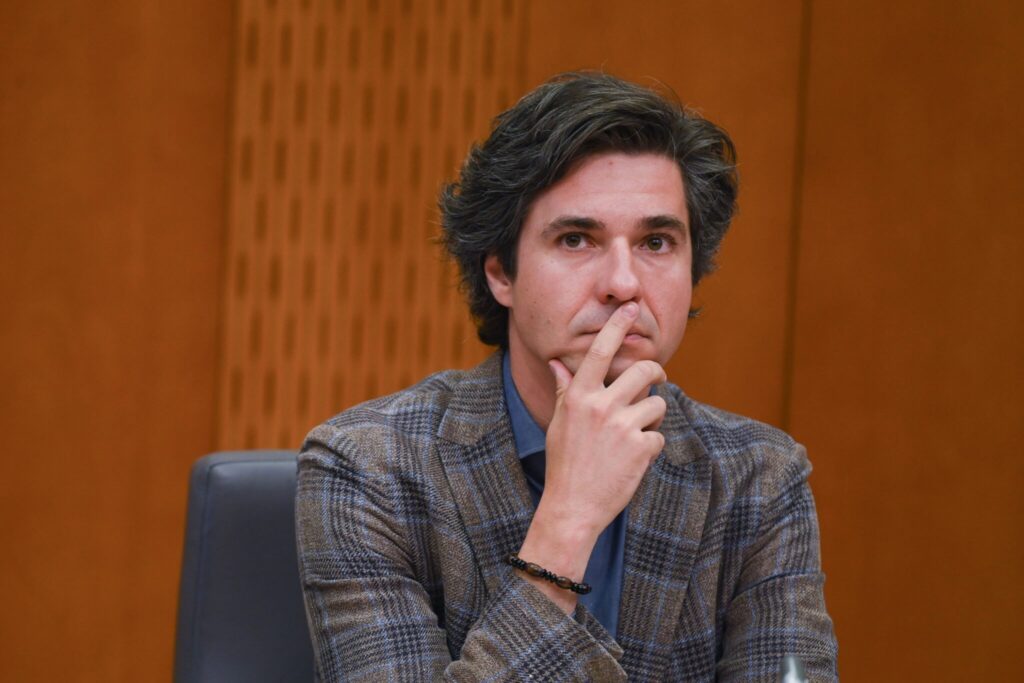Candidate for the position of Minister of Labour, Family, Social Affairs and Equal Opportunities, Luka Mesec, intends to solve the pension system by eliminating precarious work, and he also announced additional immigration of workers from abroad. This is even supposed to improve the demographic situation in Slovenia, Mesec naively believes.
At the first extraordinary session of the Committee on Labour, Family, Social Affairs and Equal Opportunities, the hearing of ministerial candidate Luka Mesec was also on the agenda. Initially, Mesec introduced himself, and this was then followed by the questions from the MPs. Slovenian Democratic Party (Slovenska demokratska stranka – SDS) MP Karmen Furman was the first to ask Mesec a question: “We could hear in the beginning that in your mandate, you want to put special emphasis on the fight against poverty.” She pointed out the problem of the rising prices, which is only supposed to get worse, and is already being felt due to the rising prices of food and energy. At the same time, autumn and winter are fast approaching, when this problem will be felt even more severely. She highlighted the minister’s intention of raising minimum pensions and wages, and also pointed out the announcement of the introduction of new, additional taxes that will cost the citizens even more money.
She also mentioned the planned repeal of the Personal Income Tax Act, which bought tax relief to everyone’s salaries. “I am interested in what your calculations of these measures are or how people will actually benefit from this, if you will raise something on the one hand, and on the other hand, additionally tax the income of citizens. We are also interested in what concrete measures you are preparing for those who are just above the minimum wage, which you intend to raise to 800 euros.” Furman also wanted to know how they came up with the amount, given the trend of wage growth in the last two years, as this amount would have been reached this year anyway. She then pointed out that according to the calculations, the poverty line is set at 813 euros of income a month.
Mesec will also have to provide extra money for homes for the elderly
The next question was asked by another SDS MP, Alenka Helbl, who focused on public and social care institutions, specifically homes for the elderly. “Due to the increase in prices of services and materials, the institutions that are successful in tenders for the renovation of capacities for the elderly are now facing the problem of the offers of potential contractors being significantly higher than the actual funds that were approved for co-financing of the renovations.” She estimated that public institutions would need approximately 20 million euros more. She wanted to know whether the new government intends to provide these funds so that renovations or new constructions would actually be possible, and she also wondered what the legal conditions will be for providing single and double rooms that need to be provided by 2023. She also asked about the conditions for ensuring adapted capacities for the case of another outbreak of a communicable disease. She also pointed out the problem of the lack of staff in the field of healthcare.
No investments have been made in homes for the elderly in the last 15 years
Aleksander Reberšek, an MP from the New Slovenia party (Nova Slovenija – NSi), also asked Mesec a question, namely: “During the Covid-19 epidemic, it became clear that the existing homes for the elderly needed to be renovated, and for a decade or more now, it has also been clear that we need new homes as well. However, practically no investments have been made in homes for the elderly in the last 15 years or more. I would like to know if you will continue with all the 145 investments that are currently underway in the field of care for the elderly and that were outlined and started during Janez Cigler Kralj’s term?”
Mesec announced additional immigration
Eva Irgl initially wanted Mesec’s answers to be more precise and complex, but she quickly realised why Mesec will also be the Minister for Solidarity-Based Future, as that will make it easier for him to hide his actual (non)knowledge of the content, because no one knows what exactly the specific term used in the name of the new ministry means. The Ministry of Labour, Family, Social Affairs and Equal Opportunities requires a broad knowledge of content, which is something that Mesec did not demonstrate at the hearing. Mesec responded by saying that the Ministry of Labour is even easier to manage than the Ministry of Labour, Family and Social Affairs, as they will deal with the housing policy. He will lose one year with the organisational and infrastructural establishment of the ministry alone.
Irgl also asked when Mesec intends to raise the disability pensions, which are way too low, as he did not state that anywhere. The latter estimated that the calculations will be arranged by the fall, because that is when we are expecting the rising of prices to worsen. Irgl also wanted to know how Mesec intends to tackle the problem of homes for the elderly, which became very apparent during the epidemic. Namely, she wanted to know how he will make sure that people can overcome the price increases and the poverty that comes with them.
Since Robert Golob announced additional taxes, the abolition of tax benefits, and the abolition of certain measures, the SDS MP was also interested in how Mesec intends to further reduce unemployment in the short term and how he will oppose raising the retirement age, as we are an ageing society. Mesec intends to save the pension system by eliminating precarious work, and he also announced additional immigration of workers from abroad. This is even supposed to improve the demographic situation in Slovenia, he naively believes.
Domen Mezeg


